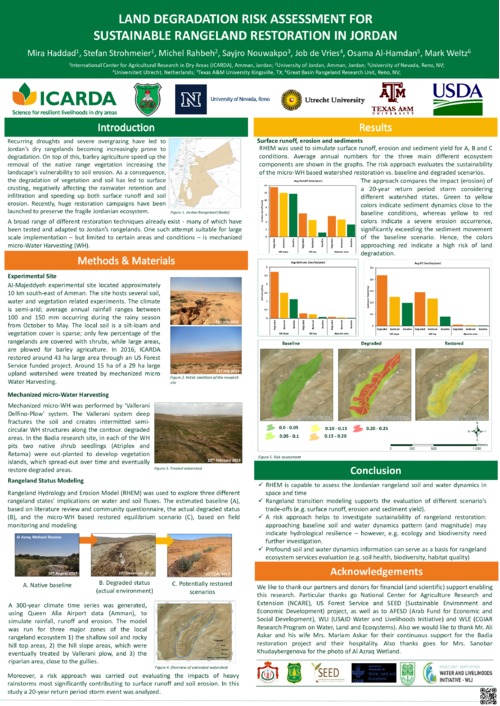Life on land: background paper
The present document is one of the background papers for the fourth session of the Africa regional forum on sustainable development, which is being held in preparation for the 2018 high-level political forum on sustainable development, to be held in New York from 9 to 18 July 2018. The theme of the regional forums is “Transformation towards sustainable and resilient societies”.
GlobeLand30 shows little cropland area loss but greater fragmentation in China
Understanding of cropland dynamics in a large geographical extent is mostly based on observations of area change, while the changes in landscape pattern are hardly assessed. The total amount of cropland in China has remained relatively stable in recent years, which might suggest there was little change. In this analysis, we combine the number of cropland patches (NP) with the total cropland area (TA) for a more comprehensive characterization of cropland change in China.
Models meet data: Challenges and opportunities in implementing land management in Earth system models
As the applications of Earth system models (ESMs) move from general climate projections toward questions of mitigation and adaptation, the inclusion of land management practices in these models becomes crucial. We carried out a survey among modeling groups to show an evolution from models able only to deal with land-cover change to more sophisticated approaches that allow also for the partial integration of land management changes. For the longer term a comprehensive land management representation can be anticipated for all major models.
Climate Change and International Security: Resource Guide 2017 - Consolidated Edition
The Climate Change and International Security Resource Guide is produced for the Brussels Dialogue on Climate Diplomacy (BDCD) which consists of a series of informal meetings to exchange information and promote cooperation among European institutions and international organisations active in the nexus between climate change and international, national, human and environmental security.
The spatial sorting of informal dwellers in cities in developing countries: Theory and evidence
We propose a theory of urban land use with endogenous property rights that applies to cities in developing countries. Households compete for where to live in the city and choose the property rights they purchase from a land administration which collects fees in inequitable ways. The model generates predictions regarding the levels and spatial patterns of residential informality in the city. Simulations show that land policies that reduce the size of the informal sector may adversely impact households in the formal sector through induced land price increases.
Global Report on Food Crises 2018
Conflict and climate change have pushed 124 million people in 51 countries into acute food security, a situation when the inability to consume adequate food represents an immediate danger to people’s lives and livelihoods. In 2017, the number of people affected by acute food insecurity increased by 11 million. These are the main findings of a publication titled, “Global Report on Food Crises,” released by the Food Security Information Network (FSIN).
Land Degradation Risk Assessment for Sustainable Rangeland Restoration in Jordan
Rangeland Hydrology and Erosion Model (RHEM) was used to explore three different rangeland states’ implications on water and soil fluxes. The estimated baseline (A), based on literature review and community questionnaire, the actual degraded status (B), and the micro-WH based restored equilibrium scenario (C), based on field monitoring and modeling
Critical factors for crop-livestock integration beyond the farm level: A cross-analysis of worldwide case studies
Despite their recognized agricultural sustainability benefits, mixed crop-livestock farms have declined in the Northern hemisphere. As such, crop-livestock integration beyond the farm level is a promising alternative to this trend, but the knowledge of critical factors and strategies towards its successful implementation is still lacking. We developed an analytical framework to assess the critical determinants of the emergence and outcomes of integration, which helped us understand farmers’ collective strategies for reducing integration transaction costs.
Stimulating the social and environmental benefits of agriculture and forestry: An EU-based comparative analysis
Stimulating an effective provision of public goods and ecosystem services from Europe’s farmland and forests is a critical challenge for policy-makers. In this paper we focus on three aspects of this challenge. Firstly, we explore the different drivers that influence the provision of public goods and ecosystem services by farming and forestry. Secondly, we identify the key motivational, institutional and socio-economic factors that can encourage the provision of these benefits.
Linking notions of justice and project outcomes in carbon offset forestry projects: Insights from a comparative study in Uganda
Over the last 20 years, Uganda has emerged as a testing ground for the various modes of carbon forestry used in Africa. Carbon forestry initiatives in Uganda raise questions of justice, given that people with comparatively negligible carbon footprints are affected by land use changes initiated by the desire of wealthy people, firms, and countries to reduce their more extensive carbon footprints.
Between socio-economic drivers and policy response: spatial and temporal patterns of tree cover change in Nepal
Despite the local and global importance of forests, deforestation driven by various socio-economic and biophysical factors continues in many countries. In Nepal, in response to massive deforestation, the community forestry program has been implemented to reduce deforestation and support livelihoods. After four decades of its inception, the effectiveness of this program on forest cover change remains mostly unknown.





